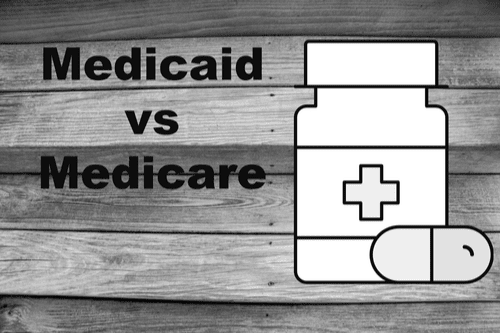Alike But Not Alike

Alike but not alike sums up the difference between Medicaid vs. Medicare.
The terms Medicaid and Medicare are often used interchangeably or are confused one for the other. While they sound similar, these two programs are actually very different.
Both programs are government programs helping to cover medical expenses.
Medicare is federally funded and provides U.S. citizens, who are age 65 and older or who have disabilities, with medical insurance- regardless of income level. People with higher incomes pay larger premiums for certain parts of Medicare.
Medicare recipients pay through payroll taxes while they were working, and through monthly premiums, once they’ve been enrolled.
Medicaid is both a state and federal program. The federal government makes the guidelines. But each individual state administers the program for people with incomes below the poverty line.
Some people are eligible for both Medicare and Medicaid.
Medicaid can pay Medicare premiums, deductibles, and copays. It can also pay for nursing homes and personal care which are not covered by Medicare.
Medicaid vs. Medicare: An Overview
MEDICAID:
Through the Affordable Care Act, healthcare was expanded to cover more U.S. citizens.
Americans with incomes 138% below the poverty line qualify for coverage in Medicaid participating states. But, unlike Medicare, which is available to every American over the age of 65, Medicaid’s strict requirements vary from state to state, and eligibility is dependent on income status and any of these requirements: age 65 years or older, pregnant women, a guardian caring for children under age 19, living with a disability, or an eligible immigrant.
Medicaid benefits include:
- Hospitalization
- Laboratory services
- X-rays
- Doctor services
- Family planning
- Nursing services
- Nursing facility services
- Home healthcare for people eligible for nursing facility services
- Clinic treatment
- Pediatric and family nurse practitioner services
- Midwife services
MEDICARE:
To receive Medicare Parts A and B you need to enroll with social security. For parts C and D, you need to enroll with a private insurance company. Medicare is divided into four parts:
Part A (Hospital Insurance)– Medicare pays for inpatient hospital stays, skilled nursing facilities, home health, and hospice care.
Part B (Medical Insurance)– This covers the costs of doctors’ visits, healthcare provider visits, lab work, x-rays, wheelchairs, walkers, outpatient surgeries, and preventive services such as disease screenings and flu shots.
Part C (Medicare Advantage) – Anyone eligible for part A and part B is eligible for part C. These plans are offered by private insurance companies that are approved by Medicare.
Part D (Prescription Drug Coverage) – Through private insurance companies, this provides prescription drug coverage and copayments for certain prescriptions.
In Summary:
Medicare and Medicaid are two U.S. government programs designed to help different populations get access to healthcare.
Medicare is an insurance program. The cost of Medicare is based on when you enrolled, what options you’ve chosen, and the services you use during the year.
Medicaid is an assistance program. Your costs are based on your income and the rules of your state.
Despite their differences, some people are eligible for both. They are called “dual eligibles”.
The benefits of Medicaid vs. Medicare can differ a great deal.
For example, Medicare won’t pay for permanent residence in a nursing home, but Medicaid does. Medicare benefits are the same across the country, but Medicaid benefits vary from state to state.
We’re Here to Help
Ultimately, when it comes to deciding on Medicaid vs. Medicare, Kabb Law is here to help you find your way through all the government rules and to help you choose the program that best suits you.
Our staff is knowledgeable and experienced in dealing with government programs. Call our social worker at 216-991-5222 and she can get you started right away.

